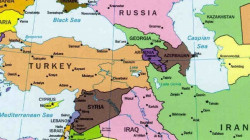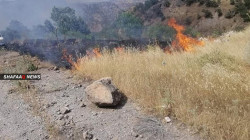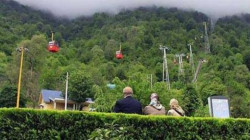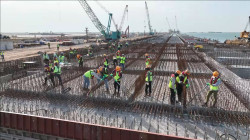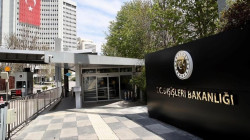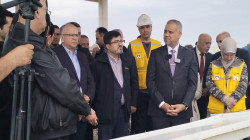Regional dynamics spurred the emergence of Iraq-Turkiye's Development Road project: analysis
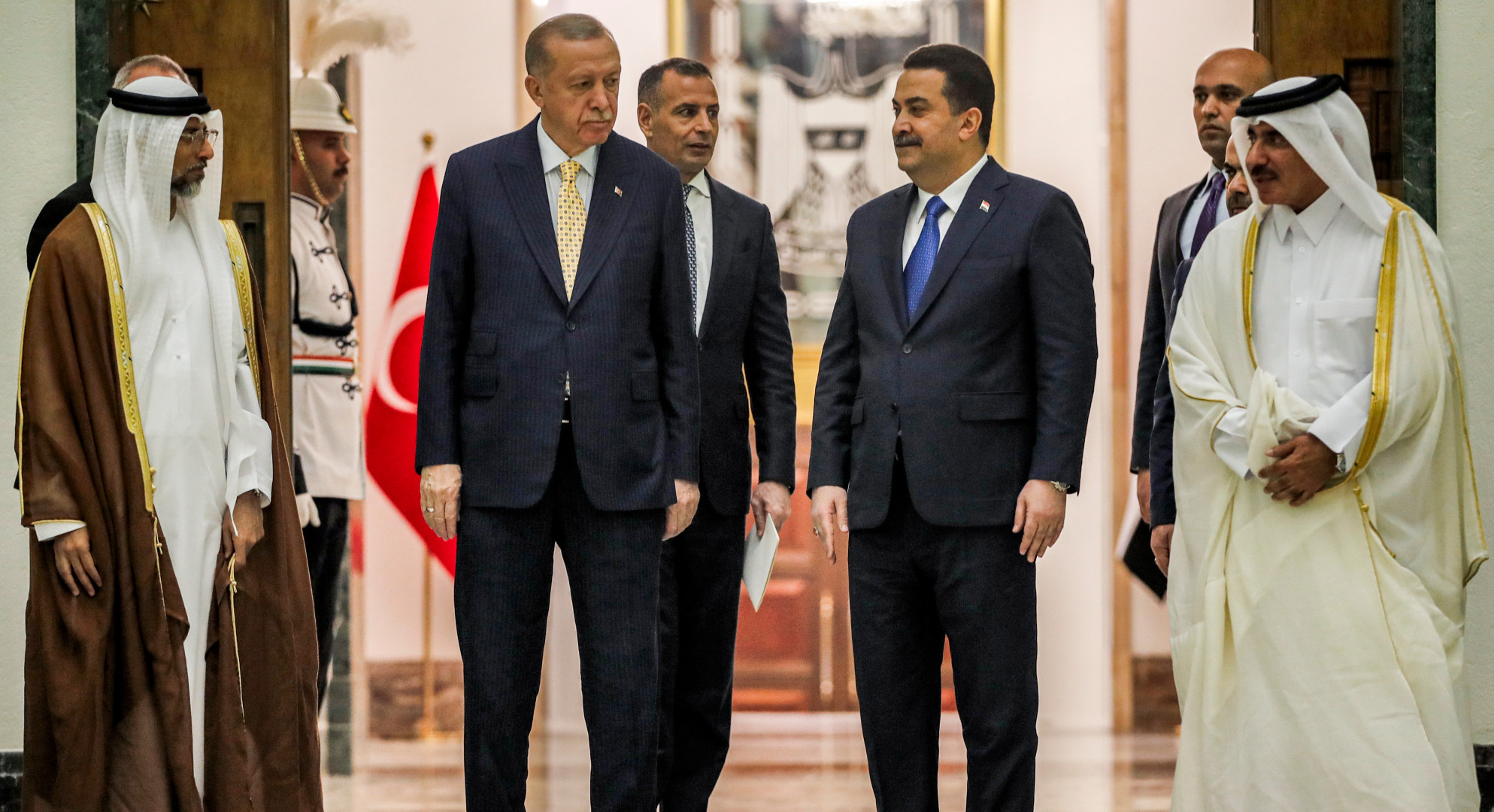
Shafaq News/ Ankara and Baghdad's ambitious "Development Road" project, which links the Turkiye to the Gulf via Iraq and probably the latter's single most important attempt to diversify is economy, is a product of broader shifts in regional geopolitics and international trade routes, an expert suggested in an analysis for the Stimson Center.
Emil Avdaliani, a professor and a scholar of silk roads, suggested that Iraq has given Turkiye permission to mount a major military operation against the PKK in the Kurdistan Region to enhance cooperation on water management and a new trade corridor.
On April 22, Turkish President Recep Tayyip Erdoğan made a rare trip — his first in 13 years — to Iraq. There, the two sides signed 26 agreements and memorandums, including one on enhanced cooperation in energy, trade, and water management.
The neighbors have experienced numerous tumultuous periods and disputes over issues ranging from border security to water management, to transit. Yet geopolitical developments in the region such as the war in Gaza and the emergence of multiple rival trade routes are pushing the two closer together.
In a clear win for Ankara, Iraqi authorities essentially agreed to a Turkish military operation this summer in a wide swath of northern Iraq in an effort to ferret out members of the Kurdistan Workers Party (PKK), which Turkiye considers a terrorist group.
In exchange, Turkiye made important concessions regarding transborder water management. Baghdad has for years argued that dams built in Turkiye lowered the water levels in the Euphrates and Tigris rivers on which Iraq relies for irrigation. To resolve the issue, the two governments reached a 10-year agreement that would guarantee adequate water levels coming from Turkiye. Ankara also pledged to help Iraq build modern irrigation systems to maximize the impact of the deal for Iraqi agriculture.
At the same time, Ankara and Baghdad failed to reach agreement on resuming the export of Iraqi oil via the Kirkuk-Ceyhan pipeline. Renovation of the line, which can carry 350,000 barrels per day, is almost complete but differences remain between Baghdad and Erbil over how to divide the revenue.
The major achievement of Erdoğan’s visit was an agreement on the so-called Development Road, a $17 billion mega-project to connect Turkiye with the Persian Gulf. Along with Iraq and Turkiye, the United Arab Emirates and Qatar signed the agreement, seeking alternative routes to trade with the Mediterranean basin and the European Union (EU).
For Turkiye, the stakes of the Development Road are high as it tries to mitigate its exclusion from another corridor project developed by the Western powers, Arab countries of the Persian Gulf, and India. Known as the India-Middle East-Europe Economic Corridor or IMEC, the route is set to pass through Saudi Arabia and Israel. Though the war in Gaza has slowed the project, the crisis in the Red Sea could ultimately help spur its construction.
Turkiye has issued statements bemoaning its exclusion from IMEC and instead pushed for a 740-mile-long transit route via Iraq. It fits into Ankara’s ambition to transform the country into not only an East-West but also a North-South trade and transit hub.
The stakes are even higher for Iraq, which sees the Development Road as the single most important project to diversify the country’s oil-dependent economy. With about 93 percent of its revenues coming from the oil sector, Iraq sees the road as a chance to create a new type of economy with a focus on greener energy and a shift in investment from major population centers to desert areas where infrastructure such as roads, a railway, and new settlements are to be constructed.
The Development Road is a long-standing Iraqi ambition that was first unveiled in the 1980s under the name of Dry Canal, but its realization was postponed time and again due to unfavorable geopolitical conditions including the 1980-88 Iran-Iraq war, the 1991 Gulf War, economic sanctions, and the 2003 US invasion. Now, from Baghdad’s perspective, the situation has changed. With Turkiye’s strong backing, uncertainties about IMEC, and instability in the Red Sea due to attacks on shipping by the Yemeni Houthis, the Development Road might play, if not a major role, then a complementary one as a viable trade route between Europe and Asia.
In an age of reconfiguration of Eurasian trade routes, in which Russia, China, Iran, and the Arab states are all promoting new connectivity projects, both Iraq and Turkiye seek a greater role in linking the Indian Ocean and Europe. The project reflects Iraq’s ambitions to elevate its status and become an important regional player.
History highlights the potential of the new corridor. From the Roman to Sasanian to Arab eras, trade through the Persian Gulf connecting the Indian Ocean with Asia Minor and Syria had a critical role in the economic calculations of imperial powers. The Ottoman Empire and Safavid Iran also vied for control of this vital artery, while in the early 20th century, European powers sought connectivity between the Persian Gulf and the Mediterranean.
Yet there are several major obstacles hampering the modern Development Road. A big one is the perennially unstable situation on the Iraq-Turkiye border. Ankara is concerned about the PKK, which operates in Iraq and has mounted numerous attacks on infrastructure along the border. Baghdad made an important concession to Ankara by banning the PKK in March, though it did not label it as a terrorist organization – a designation that Baghdad would struggle to enforce.
There have also been concerns in Turkiye regarding links between the Patriotic Union of Kurdistan (PUK) — one of two major Iraqi Kurdish political parties — and the PKK. Overall, the security situation in Iraq is seen as detrimental to Turkish interests, which pushes Ankara to seek a military solution with an anticipated offensive into Iraq’s northernmost territories planned later this year. It is unclear how the military operation will impact the implementation of the Development Road.
Yet another challenge is neighboring Iran which holds significant influence in Iraq and has its own ambitions to become a major trade and transit passageway with the development of the International North-South Transport Corridor (INSTC). Iran holds considerable sway over armed groups inside Iraq that could undermine the construction of the Development Road. The project will thus serve as a test for Iran-Turkiye relations, which are characterized by a mixture of competing and aligning interests.
Additionally, the Iraqi government has not yet carried out a complete feasibility study for the mega-project, which would highlight both its weaknesses and real potential. Geography also does not favor Iraq. Much of the success of the project will depend on the situation in the Strait of Hormuz. If it is closed by conflict, it would effectively kill transcontinental trade through the Development Road. Another downside is Iraq’s shore on the Persian Gulf, which in many places is considered too narrow to develop this massive new corridor.
